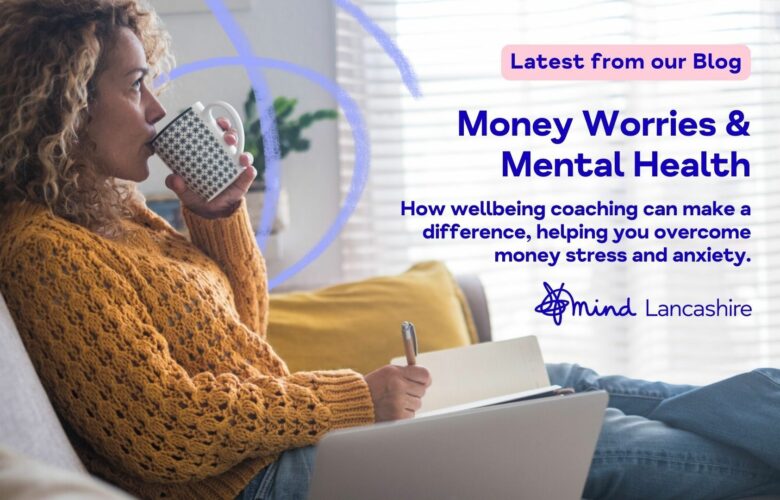Money Worries & Mental Health


How Wellbeing Coaching Can Make a Difference, helping you Overcome Money Stress and Anxiety.
#StressAwarenessMonth #StressAwareness #MentalHealth
Money and mental health are closely linked. If you have money problems, you may feel stressed, anxious, depressed, or hopeless. And if you have mental health problems, you may find it harder to manage your money, which can make your situation worse.
Lets explore why money worries affect your mental health, how wellbeing coaching can help you cope, and what you can do to build your resilience and improve your wellbeing.
Why money worries affect your mental health?
Money worries can affect your mental health in different ways, such as:
- Stress, worry or anxiety because you do not have enough money (financial anxiety).
- A low mood or feeling depressed about money.
- Lower self-esteem, or feelings of guilt or shame if you’re not earning enough or currently unemployed.
- Sleep problems

Money worries can also affect your behaviour and lifestyle, such as:
- Avoiding or ignoring money issues, like leaving bills unopened or not paying them, or putting off getting money advice.
- Skipping meals or staying home, possibly to save money, which may lead to increased social isolation and loneliness.
- Spending more to lift your mood.
- Unemployment, or not being able to work, face going to work or look for work.
Money worries can also have a negative impact on your relationships, as you may feel embarrassed, angry, or resentful towards yourself or others. You may also argue more with your partner, family, or friends about money, or withdraw from social activities.

According to a survey by the Mental Health Foundation, 34% of adults in the UK experienced anxiety and 29% experienced stress because of financial worries in the previous month. And according to the Money and Mental Health Policy Institute, half (46%) of people in problem debt also have a mental health problem.
How wellbeing coaching can help you cope?
Wellbeing coaching is a form of support that can help you improve your mental health and wellbeing. At Lancashire Mind, our wellbeing coaches listen to you, understand your situation, and help you find solutions that work for you.
Learn self-help techniques for managing your anxiety and mental health around your money worries.
- Help signpost to advice and support if needed.
- Set goals and take action to achieve them.
- Build your confidence and self-esteem.
- Develop a positive money mindset and habits.

What you can do to build your resilience and improve your wellbeing?
Resilience is the ability to cope with stress and adversity, and to bounce back from difficult situations. Building your resilience can help you deal with money worries and improve your mental health. Here are some tips to help you build your resilience and improve your wellbeing:
Be kind to yourself. Self-compassion is vital for your mental wellbeing, especially in tough times. Try to treat yourself kindly and avoid negative self-talk or unhelpful thoughts. It can also help to remember that things change and that you are not alone.
Talk about your money issues. It can help to talk about your money worries with someone you trust, like a friend, family member, or a wellbeing coach. You might also find it helpful to join a peer support group, where you can share your experiences and get support from others who understand what you are going through.
Look after your physical health. Your physical health can affect your mental health, and vice versa. Try to eat well, stay hydrated, get enough sleep, and exercise regularly. These can help you reduce stress, boost your mood, and improve your energy levels.
Do things that make you happy. Spending time on activities that you enjoy can help you relax, have fun, and feel good. This could be anything from reading a book, listening to music, gardening, or playing with a pet. You could also try something new, like learning a new skill, hobby, or language.
Seek help when you need it. If you are struggling with money or mental health problems, do not hesitate to seek professional help.
Contact Lancashire Mind today to access free, virtual adult wellbeing coaching.
There are many organisations and services that can offer you advice, support, and treatment, such as:
Money Helper, for free and impartial money advice and guidance
Citizens Advice, for information and advice on benefits, debt, and other issues
National Debtline, for free and confidential debt advice
StepChange, for free debt management and solutions
NHS Talking Therapies, for free mental health services
Samaritans, for emotional support and a listening ear, 24/7
"Money and mental health are closely linked. If you have money problems, you may feel stressed, anxious, depressed, or hopeless. And if you have mental health problems, you may find it harder to manage your money, which can make your situation worse."




